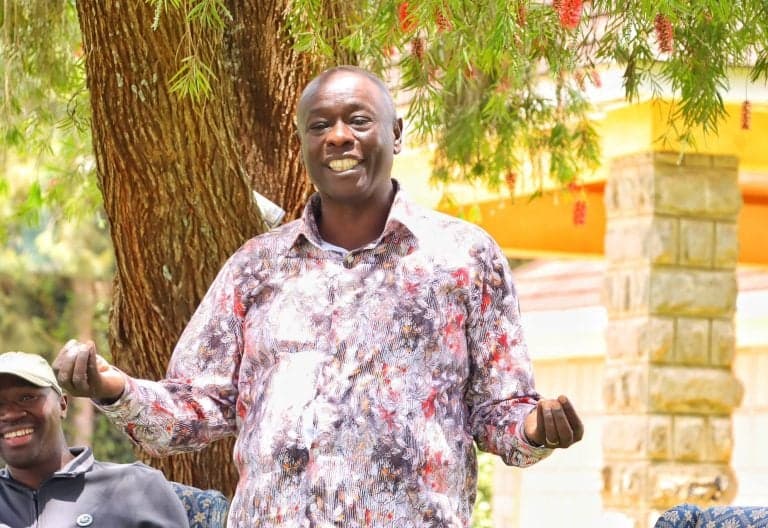We're loading the full news article for you. This includes the article content, images, author information, and related articles.
A bombshell admission by former Deputy President Rigathi Gachagua reveals a deep schism within the presidency during the 2024 tax protests, claiming he and former Attorney General Justin Muturi deliberately avoided President William Ruto's calls to oppose the bill internally.

Former Deputy President Rigathi Gachagua has claimed he and former Attorney General Justin Muturi intentionally switched off their phones to dodge calls and instructions from President William Ruto during the contentious Cabinet-level debates on the Finance Bill 2024. The explosive revelation, made on Friday, November 7, 2025, at the launch of Muturi's memoir in Nairobi, offers an unprecedented glimpse into the fractures at the highest echelons of the Kenya Kwanza government during one of its most severe crises.
“The debates on the Finance Bill 2024 were intense,” Gachagua told the audience. “Both Muturi and I were in vehement opposition to the bill. To avoid receiving instructions or being influenced, we opted to switch off our phones whenever the Finance Bill was under discussion.” This admission recasts the political turmoil of mid-2024, suggesting that while the administration presented a united front publicly, key figures were privately resisting the President's agenda.
The statement sheds new light on the eventual, dramatic collapse of the political alliance between President Ruto and Gachagua, which culminated in Gachagua's impeachment in October 2024 on charges including undermining government authority. At the time of the protests, Gachagua had publicly urged for calm and defended the government's position, asking Kenyans to give the President a chance to complete consultations. His new testimony paints a picture of internal dissent that was carefully concealed from the public.
The Finance Bill 2024 ignited nationwide protests, largely led by Kenyan youth, dubbed the 'Gen Z protests', who mobilized online under the hashtag #RejectFinanceBill2024. The bill proposed a raft of new taxes aimed at raising an additional KSh 346 billion to service national debt and fund development projects.
Among the most controversial clauses were a 16% VAT on bread, a 2.5% annual motor vehicle tax, and an eco-levy on products like sanitary pads and electronics. Critics argued these measures would drastically increase the cost of living for already struggling Kenyans.
The protests began peacefully on June 18, 2024, but escalated dramatically. On June 25, 2024, after Members of Parliament passed the bill, protesters stormed the Parliament buildings, leading to deadly clashes with security forces. At least 22 people were reported killed in the ensuing violence. The immense public pressure forced a complete reversal from the Head of State. On June 26, 2024, President Ruto addressed the nation, stating he would not sign the bill into law. “The people have spoken,” Ruto conceded, announcing the bill's withdrawal.
Gachagua’s Friday revelation suggests the internal opposition was significant. He praised Muturi as his “soulmate in cabinet,” claiming they were the only members who would speak truth to power. According to Gachagua, President Ruto would send text messages to Cabinet members during committee meetings with instructions on the official position to take, a practice he and Muturi sought to evade.
This account contrasts sharply with the public persona Gachagua maintained during the crisis. On June 26, 2024, the same day President Ruto withdrew the bill, then-DP Gachagua held a separate press conference from Mombasa, appealing to the youth to call off further protests and blaming the crisis on a dysfunctional National Intelligence Service (NIS) for failing to provide the president with accurate information on public sentiment. This separate address was seen at the time as a sign of a widening rift between the President and his deputy.
The disclosure serves as a political bombshell, retroactively justifying the deep-seated divisions that plagued the Kenya Kwanza administration. The fallout from the Finance Bill protests visibly accelerated the deterioration of Ruto and Gachagua's relationship throughout late 2024. Gachagua's impeachment was the culmination of months of public disagreements and accusations of insubordination.
Now, as a former Deputy President, Gachagua appears to be positioning himself as a dissenting voice, revealing behind-the-scenes details to craft a new political narrative ahead of future elections. He also stated at the book launch that he intends to write his own book detailing the “route of betrayal” by the administration.
For President Ruto, this testimony from his former second-in-command could prove damaging, reinforcing a perception of an administration that was internally conflicted and whose top leadership was not aligned on a policy that brought the nation to the brink. As Kenya continues to navigate the economic and political aftermath of the 2024 crisis, Gachagua's version of events will undoubtedly fuel further debate on governance, loyalty, and the pressures that shattered the country's ruling coalition.
Keep the conversation in one place—threads here stay linked to the story and in the forums.
Sign in to start a discussion
Start a conversation about this story and keep it linked here.
Other hot threads
E-sports and Gaming Community in Kenya
Active 9 months ago
The Role of Technology in Modern Agriculture (AgriTech)
Active 9 months ago
Popular Recreational Activities Across Counties
Active 9 months ago
Investing in Youth Sports Development Programs
Active 9 months ago
Key figures and persons of interest featured in this article